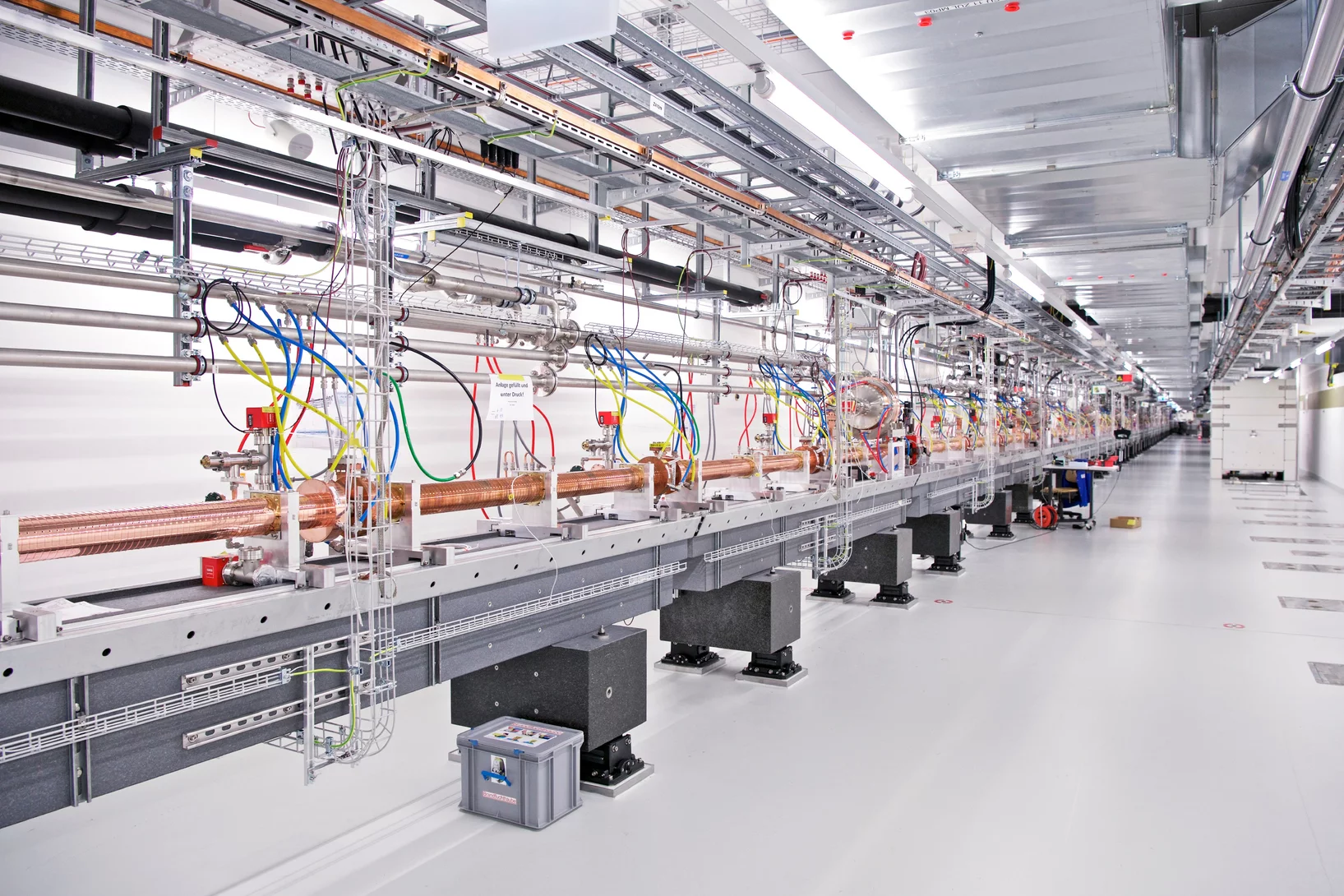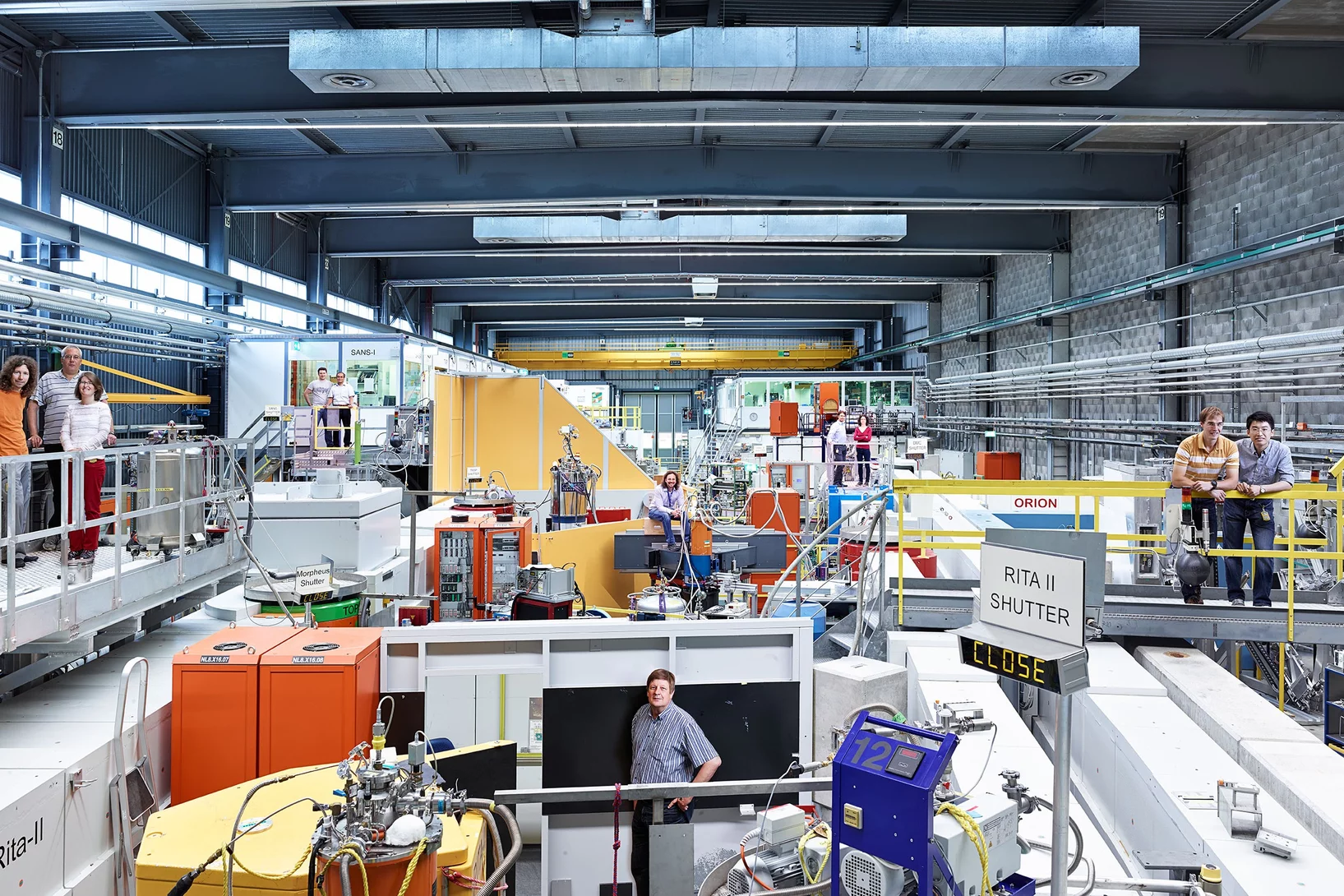Die Energieforschung am PSI konzentriert sich auf Prozesse, die in nachhaltigen und sicheren Technologien für eine möglichst CO2-freie Energieversorgung eingesetzt werden können. Wichtiger Schwerpunkt sind erneuerbare Energien. Auf der Versuchsplattform ESI (Energy System Integration) können Forschung und Industrie Lösungsansätze zur Einbindung erneuerbarer Energien in das Energiesystem testen. Ein weiterer Schwerpunkt des Bereichs ist die sichere Anwendung von Kernenergie. Diese Aktivitäten werden ergänzt durch Analysen zur ganzheitlichen Betrachtung von Energiesystemen. In der Klima- und Umweltforschung werden chemische Prozesse in der Atmosphäre untersucht.
Mehr dazu unter Überblick Energie und Klima
Öffentliche Führung: Radiopharmazie
Tauchen Sie ein in die faszinierende Welt der Radiopharmazie am Paul Scherrer Institut. Erfahren Sie, wie radioaktive Stoffe zur Diagnostik und Therapie schwerwiegender Erkrankungen wie Krebs eingesetzt werden.
Öffentliche Führung: Hotlabor
Entdecken Sie bei unserer Führung die Kernanlage Hotlabor, eine für die Schweiz einzigartige Experimentiereinrichtung zur nukleartechnischen Untersuchung und Analyse von hochradioaktiven Materialien.
Öffentliche Führung: SwissFEL
Der SwissFEL ist eine von gerade mal fünf Röntgenlaser-Anlagen weltweit, welche harte Röntgenstrahlung in Laserqualität erzeugen und der Forschung zur Verfügung stellen können. Auf unserer Führung werden wir die Funktionsweise und die wichtigsten Forschungsziele des Röntgenlasers kennenlernen und dann auf einem Rundgang selber einen Blick auf die wichtigsten Komponenten der 700 m langen Anlage werfen.
Die Kabel der SLS
Gebäudetechnik, Magnete, IT – viele Gruppen sind am Upgrade der SLS beteiligt. Ihr verbindendes Element sind mehrere hundert Kilometer Kabel.
IMPACT: Upgrade an PSI-Forschungsanlage beschlossen
Die Finanzierung der Umbauten an der Protonenbeschleunigeranlage des PSI wurde vom Schweizer Parlament bewilligt.
Fractional quasiparticles in three dimensions
Specific signatures of fractionalization have been observed in a three-dimensional system known as quantum spin ice.
Mapping the Nanoscale Architecture of Functional Materials
A new X-ray technique reveals the 3D orientation of ordered material structures at the nanoscale, allowing new insights into material functionality.
Exotics among the atoms
Muon experiments at the PSI are focusing on different isotopes.
Together for Science with Neutrons, Muons and X-rays
Strategic partnership between research facilities in UK and Switzerland will create new capabilities to address global challenges using neutrons, muons and X-rays.
ANAXAM feiert 5-jähriges Jubiläum
Wir gratulieren ANAXAM ganz herzlich zu seinem fünfjährigen Bestehen! Seit seiner Gründung im Jahr 2019 hat sich ANAXAM als verlässlicher Partner für die Industrie etabliert, der innovative Lösungen in der angewandten Materialanalytik bietet.
Jahresschlussapéro 2024
Ein erfolgreiches Berufsjahr geht zu Ende
Brigitte Decrausaz receives DECTRIS Award of Best Master's Thesis in Experimental Physics at UZH
Brigitte Decrausaz, PhD student at LNS, received the DECTRIS Award 2023/2024 for the Best Master's Thesis in Experimental Physics at the University of Zürich.
Auf dem Weg zum Kohlendioxid-armen Strassenverkehr
Forschende des Paul Scherrer Instituts PSI zeigen, wie sich der Strassenverkehr durch eine geschickte Integration von erneuerbaren Energien dekarbonisieren lässt.
Not Rocket Science, just Nuclear Rocket Science
The PSI Laboratory for Reactor Physics and Thermal-Hydraulics (LRT) conducts computational and experimental research with focus on the safety of nuclear reactors and systems. In recent years, it established the EPSILON program to coordinate and consolidate its research activities on nuclear space applications. Among other things, developments were initiated towards an open-source European platform for high-fidelity simulations and experiments dedicated to space nuclear reactors. Referred to as the openSPACE platform, its underlying concepts are a) to include not only solvers but also reference simulation models as well as experimental validation data; b) to make all of these available to the broader and combined nuclear- and space communities for usage and/or further developments. Through this, the goal is thus not only to facilitate collaborative research in this area but also to enable effective support to the European Space Agency for thorough design, safety and performance evaluations of nuclear reactor systems for in-space propulsion and/or surface power. A first development phase focused on nuclear electric propulsion was proposed and retained among the two projects selected in 2023 by the Swiss National Science Foundation (SNSF) for its MARVIS call (Multidisciplinary Advanced Research Ventures in Space) and funded by the Swiss Secretariat for Research and Innovation (SERI). This project, to be conducted via four inter-connected PhD theses, was launched in October 2024 and this marks thus a key milestone for the propulsion of PSI nuclear research towards space.
Scientist careers: Kaoutar Radi, participant of CONNECT Round 5, now Technical Project Manager in the development team of Hilti's Diamond Business Unit
The CONNECT program fosters exchange between highly qualified and ambitious female scientists and role models working in industry. In addition to direct matches between program participants and partner companies, the program encourages scientists to explore and pursue career options beyond academia. Every year, ca. 35 scientists and 3-4 partner companies, plus the federal administration, sponsors, universities of applied sciences and startups benefit from the program. In today's post, meet Kaoutar Radi who participated in CONNECT Round 5 and got encouraged to continue her career at Hilti, one of our partner companies. She tells us about her journey from wanting to explore potential career paths, to the connection she felt during the visit at Hilti, and her current role as technical project manager in the development team at Hilti's Diamond Business Unit.
Origin of the Suppression of Magnetic Order in MnSi under Hydrostatic Pressure
We experimentally study the evolution of the magnetic moment 𝑚 and exchange interaction 𝐽 as a function of hydrostatic pressure in the zero-field helimagnetic phase of the strongly correlated electron system MnSi. The suppression of magnetic order at ≈1.5 GPa is shown to arise from the 𝐽 collapse and not from a quantum fluctuations induced reduction of 𝑚. Our work provides benchmarks ...
Preparing the Future of PSI Large Facilities in Atmospheric Research
The Multiphase Chemistry Group in the Laboratory of Atmospheric Chemistry (LAC) looks back to a nearly 20 years record of activities with in situ X-ray photoelectron spectroscopy (XPS) and in situ scanning transmission X-ray spectromicroscopy (STXM) to address key fundamental questions in atmospheric chemistry. This is the time to consider new horizons, align with current and future needs in atmospheric sciences, and to identify novel opportunities driven by upcoming trends in methods, technologies and facilities. This has been the topic of the Workshop ‘X-ray and Neutron Spectroscopy, Scattering and Imaging in Atmospheric Chemistry’, held at PSI 13 – 15 November 2024.
Anionic Disorder and Its Impact on the Surface Electronic Structure of Oxynitride Photoactive Semiconductors
The conversion of solar energy into chemical energy, stored in the form of hydrogen, bears enormous potential as a sustainable fuel for powering emerging technologies. Photoactive oxynitrides are promising materials for splitting water into molecular oxygen and hydrogen. However, one of the issues limiting widespread commercial use of oxynitrides is degradation during operation. While recent studies have shown the loss of nitrogen, its relation to reduced efficiency has not been directly and systematically addressed with experiments. In this study, we demonstrate the impact of the anionic stoichiometry of BaTaOxNy on its electronic structure and functional properties. Through experimental ion scattering, electron microscopy, and photoelectron spectroscopy investigations, we determine the anionic composition ranging from the bulk toward the surface of BaTaOxNy thin films. This further serves as input for band structure computations modeling the substitutional disorder of the anion sites. Combining our experimental and computational approaches, we reveal the depth-dependent elemental composition of oxynitride films, resulting in downward band bending and the loss of semiconducting character toward the surface. Extending beyond idealized systems, we demonstrate the relation between the electronic properties of real oxynitride photoanodes and their performance, providing guidelines for engineering highly efficient photoelectrodes and photocatalysts for clean hydrogen production.
IMPACT für die Schweizer Gesellschaft
Weltspitze bei den Myonen und in der Herstellung medizinischer Radionuklide: Die weitreichende Bedeutsamkeit des geplanten Upgrades.
Nanolino, die neue PSI-Kita ist eröffnet
Die Kita-Kids sind wieder auf den PSI-Campus und wir überraschten sie mit Spielgeräten aber auch mit viel Staub.
Operando phase mapping in multi-material laser powder bed fusion
Additive manufacturing (AM) or “3D printing” of metals, which builds structure layer by layer, has revolutionized the production of intricate 3D designs. Among its techniques, laser powder bed fusion (PBF-LB) excels in creating metallic parts with intricate designs and high precision. This process can combine different metals into innovative multi-material components with tailored properties, with regards to e.g., strength and thermal conductivity, surpassing the capabilities of single-material designs. However, ....
Acoustic emission signature of a martensitic transformation
Acoustic emission monitoring in 3D printing: real-time insights into martensitic phase transformations and crack formation.
Mein erster Kunde im Zentrallager
Der Kunde ist König!
Im fliegenden Labor
Die Nationale Alarmzentrale NAZ führt jährlich mit Unterstützung des PSI Messflüge durch, um die radiologische Lage der Schweiz zu bestimmen.
Spannende Momente vom Nationalen Zukunftstag am PSI
Die nächste Generation von Fachkräften am PSI und hat einen unvergesslichen Zukunftstag erlebt!
Neat, precise and brighter than ever
Researchers at SwissFEL succeed in improving the temporal coherence of XFEL pulses
SμS call for proposals I-25 is still open
The call for SμS proposals I-25 is still open. Submission deadline: 01 December 2024
SINQ call for proposals is closed now
The recent SINQ call I-25 was closed on 15 November 2024. More than 230 new proposals were received.
Exact solution of the classical and quantum Heisenberg mean field spin glasses
We solve and elucidate the physics of quantum Heisenberg spins glasses, which governs the local moments in randomly doped, strongly correlated materials.
Pioniere auf dem Weg zu nachhaltigen Energietechnologien
AlphaSYNT und das PSI erhalten Unterstützung vom Forschungsfonds Aargau, um die Hochskalierung des Reaktordesigns in den zweistelligen MW-Bereich anzustreben.






























